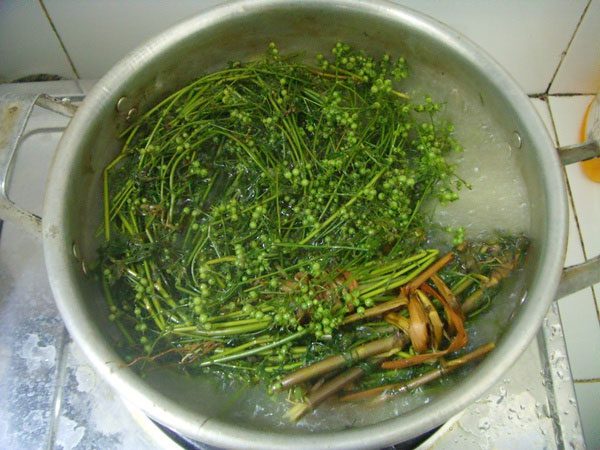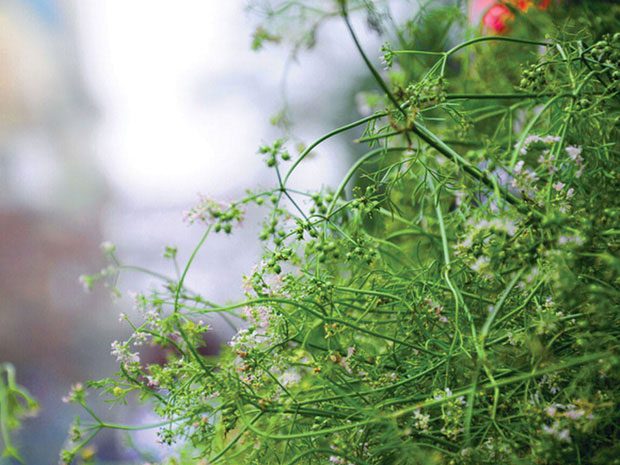Those who have just eaten should avoid bathing with the aroma of coriander leaves, as it can cause blood vessels to constrict, leading to anemia in the abdominal area, heart complications, poor digestion, and dizziness.
What is the Tradition of Bathing with Coriander Water?
Coriander is not only a spice used in cooking or a medicinal herb, but it also holds great significance in the spiritual life of the Vietnamese people. Among the many customs observed during the Lunar New Year, bathing with coriander leaves on New Year’s Eve is one cultural practice that many families still maintain to this day.
The tradition of cleansing on New Year’s Eve (bathing with coriander leaves) has been practiced by most Vietnamese people from ancient times until now, passed down through generations. Accordingly, elders and grandparents in families often remind their descendants to buy coriander leaves to prepare water for bathing on the 29th or 30th of the last lunar month.
According to folk beliefs, bathing with coriander leaf water helps to dispel the misfortunes of the old year and cleanses the body, refreshing it to welcome a better and happier new year. In some places, the bathing ritual on the 30th of Tet is referred to as “The tradition of cleansing on New Year’s Eve.”
Benefits of Coriander Leaves
Coriander is rich in vitamins such as B6, B12, A, and C, as well as minerals including thiamine, riboflavin, niacin, pantothenic acid, folate, choline, iron, and magnesium. It also contains essential compounds like carbohydrates, proteins, and fats.
Numerous scientific studies have proven the health benefits of coriander.
According to herbalist Ngo Duc Phuong (Vietnamese Traditional Medicine Institute), in traditional medicine, coriander is spicy, warm, non-toxic, aids digestion, promotes urination, combats fatigue, improves blood circulation, alleviates stress, and helps restore health while keeping the body fragrant and clean.
Bathing with coriander leaf water is also highly beneficial for health. Specifically, coriander helps treat depression, stress, headaches, as well as effectively reduces pain and treats colds.
Therefore, bathing with boiled coriander seeds or leaves can enhance skin cleanliness. Each time one bathes with coriander leaves or seeds, the body sweats more, leading to cleaner skin while helping to eliminate bacteria and providing some protection against infectious diseases.

Bathing with coriander leaves has been a tradition among Vietnamese people for generations.
Additionally, folk practices often involve using the stems of coriander and some other herbs to prepare bathing water for those suffering from measles, helping them recover more quickly.
Moreover, the aroma of coriander leaves, which is spicy and warm, helps improve blood circulation, relieve stress, and restore health. Many studies have indicated that this plant also possesses antibacterial and antiseptic properties. Coriander essential oil contains high levels of antioxidants, which can reduce skin inflammation and prevent infections.
Furthermore, herbalist Ngo Duc Phuong emphasizes that at the end of the year, people use fresh (or dried) coriander to prepare steaming water for the house and for bathing and washing faces to ward off misfortunes of the old year and usher in a new year filled with good luck.
To prepare coriander water, housewives need to prepare two bunches of coriander, ginger, and salt. First, wash the coriander leaves and ginger, crush the ginger (it should be crushed, not finely chopped), pour in water, and bring to a boil. After boiling, strain the coriander water into a basin, add a little salt, dilute with warm water, and use it for bathing.
During the end of the year, alongside the fragrant sticky rice cake, the basin of coriander water is also an essential scent in the household.
Many young people jokingly say that when their mother forgets to buy coriander for bathing, it means that Tet is still far away. Whether in rural areas or cities, during Tet, Vietnamese people do not forget to bathe with coriander leaves as a way to wash away the unpleasantness of the old year, leaving only a feeling of cleanliness and freshness to welcome the new year.
In addition to bathing, many people also prepare coriander water on New Year’s Eve to steam the house, seeking prosperity for the new year.
- However, not everyone can bathe with this distinctly fragrant water. Accordingly, those suffering from skin diseases such as eczema, abrasions, peeling skin, or skin infections should avoid bathing with any type of leaf water, including coriander.
- Moreover, individuals who have just eaten should also refrain from bathing with coriander, as it can cause blood vessels to constrict, leading to anemia in the abdominal area and heart, resulting in poor digestion, dizziness, and rapid heartbeat.

People with skin conditions should not bathe with coriander leaves.
- Do not bathe children who have measles or chickenpox while they are feverish, in the incubation period of measles, or after the rash has appeared, and even right after the measles has subsided. This is because doing so could inadvertently cause the child to suffer from additional allergies.
- Particularly, housewives should also be cautious about using coriander seeds or leaves to bathe children with measles, as some children may have sensitive skin, and this could inadvertently lead to further allergic reactions.
- Do not use coriander leaf water to bathe newborns.
Precautions When Bathing with Coriander Leaves
According to recommendations from traditional medicine doctors, before bathing with coriander leaves or any type of leaves, it is essential to consult with a qualified physician.
The coriander chosen for bathing must be the mature type that has flowered and fruited, with stems that have changed from green to brownish-purple, and when boiled, it should emit a fragrant, spicy aroma that is very distinctive.
Avoid bathing with overly concentrated coriander water; it can be diluted by adding hot or cold water for a more comfortable bathing experience.
Before using coriander leaves for bathing, ensure they are thoroughly washed and boiled to avoid contamination.
It is advisable to wash the coriander leaves well before preparing the bathing water to eliminate impurities and bacteria that may cling to the leaves.
Before bathing, it is recommended to test on a small area of the skin to ensure that you do not have any adverse reactions to the coriander bathing water, which could harm the skin.
We should also dilute coriander leaf water before bathing, keeping it at a comfortably warm temperature; avoid using boiling water that could cause burns. It is particularly important to limit the use of coriander for patients with asthma or chronic bronchitis, as the aroma of coriander can trigger respiratory irritations and allergies.


















































